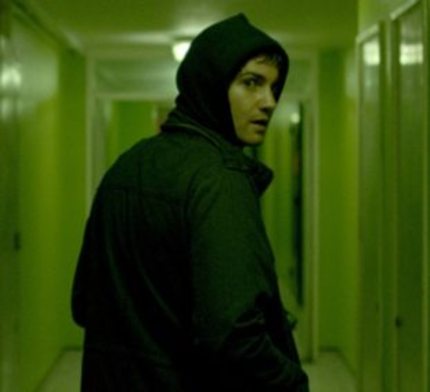TADFF 10: HEARTLESS Review

The one thing that keeps James from becoming an agoraphobic shut-in is his photography. It actually emboldens him to walk around in some dangerous neighborhoods at night (either that or he fancies himself more or less invisibly non-descript) and it provides an in for the gorgeous girl he spots doing a modeling shoot in the studio he borrows the dark-room from. When he begins to see manifestations of some sort of sharp-toothed demons in both his photographs and motifs scrawled in the neighborhoods graffiti he is not exactly sure what to do other than shrivel further inward. Ridley uses jump-scares not in the fashion of the usual horror movie, where someone wanders down a dark tunnel (these scenes are in the film, but played opposite) rather he uses it to reflect the main characters state of mind: Jumpy. It was a welcome, even savvy, use of a technique that too often is used out of laziness or the need to keep the audience aware the something is happening. The director here is delivering an unorthodox film made out of somewhat familiar pieces all juggled around and turned inside out. Eventually, James encounters Papa B, a mutant gangster for which the B may be the initial of Beelzebub who offers to remove the heart-shaped birthmark for a 'small price.' Not just playing to James vanity or a 'quick solution and all will be better' Papa B offers a variation on the cuckoo-clock speech in The Third Man playing to James artistic side, "Violence is the engine of progress" both in art and in humanity. Things go to hell, often literally, from there.
Visually, the film fluctuates from posh cinematography to sickly lit green and yellow interiors. There are numerous playful uses of heart imagery, from the obvious (birthmark) and framing a victim in a heart of spray paint to the more subtle webbed pair of fingers on Papa B. It reminds me of the way that the Coen Brothers use the hat imagery (and in the dialogue) of Miller's Crossing. Even the music in Heartless (songs written by the director) seems to be driving the plot and the meaning of the film, but, refreshingly, things seem to not be in a mad-dash to get there. From James' relationship with the model to some of the dark deeds his character is driven/coerced/threatened to perform all take its time to sink you into the icky-sweet morass of the films morality. Ridley is a jack-of-all-trades artist: An author of both novels and children's books, photographer, painter, performance artist, playwright and director of three offbeat films including this one, all including dark super-natural overtones.
Heartless belies easy classification, yet remains down-to-earth in execution mainly from the collection of wonderful (even offbeat) performances of his cast. Sturgess, on screen in just about every single scene, is wonderfully low-key yet offers the set of strength (and gruesome muster) that any downtrodden hero in a Brothers Grimm tale should possess. Eddie Marsan absolutely steals the movie in his single scene that, well, positively crackles with energy. Timothy Spall, usually playing cretinous henchmen in Hollywood blockbusters or 5-O'Clock shadow sad-sacks in his native England plays against type as a wonderful caregiver (the dead father in flashback) who encouraged his sons self-esteem through unconditional love and whose untimely departure probably created some of the current abyss. His character is afforded scan screen-time, but is the lynchpin of the film. A dark message that will most definitely put off a mainstream audience, in order to truly appreciate all the good things in your life, you have to lose them utterly; being lost in that dark forest is actually a blessing. On an emotional level, Heartless is indeed terribly beautiful.

Do you feel this content is inappropriate or infringes upon your rights? Click here to report it, or see our DMCA policy.






